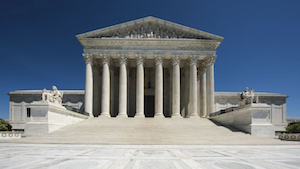By Mary C. Moffatt
On June 29, 2023, the U.S. Supreme Court issued a unanimous decision in Groff v. DeJoy, 600 U.S. 447, 143 S. Ct. 2279 (2023), clarifying the standard for employers with respect to religious accommodations in the workplace.
Title VII of the Civil Rights Act of 1964 prohibits discrimination in employment based on religion and requires employers to accommodate religious practices of employees, subject to the defense of “undue hardship.” 42 USC §2000e(j). The issue in Groff turned on what constitutes “undue hardship” in the context of a religious accommodation.
Case Facts
The plaintiff in the case, Gerald Groff, is an Evangelical Christian who objected to working on Sundays. The named defendant, Louis DeJoy, was the Postmaster General representing the employer, the United States Postal Service (“USPS”).
In 2012, Groff became employed with the USPS as a mail delivery worker. Over the years, he was able to avoid working on Sundays by rotating his assignments and various transfers. In 2013, the USPS entered an agreement with Amazon to facilitate Sunday deliveries. For several years, as a Rural Carrier Associate, Groff was not required to make Sunday deliveries but in 2016 that changed. Groff sought a transfer to an even smaller community where, at the time, USPS did not make Sunday deliveries. That too eventually changed but Groff was able to avoid Sunday assignments by other employees being assigned to make those deliveries. Over the next few months however, Groff began to receive progressive discipline for refusing to work on Sundays.
In January 2019, Groff resigned and sued under Title VII, asserting that USPS could have accommodated his refusal to work on the Sabbath without undue hardship. Groff claimed his resignation was in light of his anticipated termination and thus the trial court and the court of appeals found there were genuine issues of material fact as to whether he had suffered an adverse employment action.
However, on the ultimate issue under Title VII, the District Court granted summary judgment to the employer, USPS, finding that exempting Groff from Sunday work imposed undue hardship on his co-workers, disrupted the workplace and overall workflow, and lowered employee morale. On appeal, the Third Circuit affirmed the District Court’s decision, again finding in favor of USPS. Groff appealed to the Supreme Court.
Why is the Groff decision significant?
The lower courts decided in favor of the employer, USPS, based on long-standing precedent such as that set forth in the Supreme Court’s 1977 decision in Trans World Airlines, Inc. v. Hardison, 432 U. S. 63, 97 S. Ct. 2264, 53 L. Ed. 2d 113, and which the Court of Appeals (and other courts) construed to mean “that requiring an employer ‘to bear more than a de minimis cost’ to provide a religious accommodation is an undue hardship.” Groff, 35 F. 4th 162, 174, n. 18 (quoting Hardison, 432 U. S., at 84, 97 S. Ct. 2264, 53 L. Ed. 2d 113.
In considering workplace accommodation issues based on religious reasons, Courts have followed TransWorld Airlines v. Hardison. 432 U.S.63 (1977) for years. Under Hardison, and based on a long history of court decisions, an employer could establish undue hardship under Title VII by showing the accommodation requested would create a greater than “de minimis” (very small or trifling) cost to the business.
In Groff, the Supreme Court did not overrule existing precedent, but instead clarified it, holding that when faced with an employee’s request for religious accommodation, in order to deny the request based on undue hardship, employers must show that the undue hardship created goes beyond “de minimis” and instead must show that the accommodation would result in “substantial increased costs in relation to the conduct of its particular business.” The Court observed that, by definition, undue hardship is not shown by just “some sort of additional costs.” Rather, for a hardship to be “undue”, it must rise to an “excessive” or “unjustifiable level.” The Court also noted that other relevant factors would be considered under the clarified standard, such as the size and operating costs of the employer.
Given the facts of Groff, the Supreme Court also considered whether an impact on co-workers could be considered undue hardship. Specifically, the Court held:
Title VII requires that an employer reasonably accommodate an employee’s practice of religion, not merely that it assesses the reasonableness of a particular possible accommodation or accommodations. See Adeyeye, 721 F. 3d, at 455; see also Brief for United States 30, 33, 39. This distinction matters. Faced with an accommodation request like Groff’s, it would not be enough for an employer to conclude that forcing other employees to work overtime would constitute an undue hardship. Consideration of other options, such as voluntary shift swapping, would also be necessary.
The Court likewise held that “bias or hostility to a religious practice” by co-workers and/or customers would not constitute undue hardship. Groff, 143 S. Ct. 2279, 2296-2297.
In her concurring opinion, Justice Sotomayor wrote: “To be sure, some effects on co-workers will not constitute “undue hardship” under Title VII. For example, animus toward a protected group is not a cognizable “hardship” under any antidiscrimination statute…. In addition, some hardships, such as the labor costs of coordinating voluntary shift swaps, are not “undue” because they are too insubstantial. See 29 CFR §§1605.2(d)(1)(i), (e)(1). Nevertheless, if there is an undue hardship on “the conduct of the employer’s business,” 42 U. S. C. §2000e(j), then such hardship is sufficient, even if it consists of hardship on employees.”
Conclusion and Recommended Steps for Employers
While the Supreme Court’ decision is less than clear on what will or will not constitute undue hardship going forward, the Groff ruling clearly requires employers to conduct a close evaluation of religious accommodation requests, including a thorough analysis of whether the burden and costs of providing the accommodation will truly result in undue hardship as shown by “substantial increased costs” for the business. The facts supporting such an analysis by employers should go beyond speculation and be well documented.
The Groff decision is considered a strong victory by those advocating for religious accommodations in the workplace. Employers will need to look at future religious accommodation requests with this clarified standard in mind. Employers should also review and update policies regarding accommodations in the workplace and include religious accommodation in supervisory training.

Wimberly Lawson Wright Daves & Jones PLLC
Knoxville, Tennessee office
mmoffatt@wimberlylawson.com
